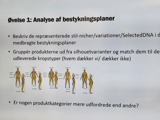Final report from the project MCC Fashion; Mass Customization for Circularity
The research from the Mass Customization for Circularity (MCC Fashion) project reveals a pressing need to rethink fashion industry practices
The fashion industry’s dominant model of fast fashion—producing mass-market garments based on standardized sizing and trend forecasts—continues to fall short in both environmental sustainability and consumer inclusivity. While industry change is often focused on materials like organic cotton and recycled polyester, researchers argue that this is not enough. The MCC Fashion project proposes a deeper, more systemic shift: mass customization informed by real-world user data.

MCC FASHION: Mass Customization for Circularity
In the past 15 years the use phase of garments is decreased by 36% and the clothing production is app. doubled btw. 2000-2015. An estimated one-third of imported garments to Europe is never sold. The fast fashion (one size fits all) – size and preference wise – is obsolete. Thus, there is a need to address the industry's lack of knowledge about user diversity, niches and the systematic approach to collection building (RM p. 17).
The aim of this project is to develop a set of design ontologies for the variation of user niches and their stated preferences for fit and style. The specific objective is to develop a framework addressing mass customization for circularity in fashion.
The project contributes to fulfil strategic goals for lowering the CO2e. Meeting changing demands from legislation, market and end-users, will enable the Danish fashion industry to strengthen the export market and increase employment. This project will enable the industry to be first movers and thereby achieve a market position in the transition to mass customization and circular economy.
Participating partners: Design School, Kolding, The Royal Danish Academy, Via University College, Bestseller A/S, Coze Nordic.
ADJUST FASHION COMPANIES' PRODUCT DECELOPMENT AND REALISE SUBSTANTIAL BENEFITS FOR CLIMATE ENVIRONMENT, ECONOMY AND COMSUMERS
Read the column in Wastetech, authored by three researchers involved in the MCC – Mass Customization for Circularity
Poor fit in clothing stems from a lack of knowledge about customers' bodies and preferences, as well as the economic constraints under which the fashion industry currently operates. It is well understood that fit is the critical factor influencing customers' willingness to pay and to wear and care for their clothes longer. By adjusting fashion companies' product development to create more inclusive designs, substantial benefits can be realized for the climate, environment, economy, and consumers. This is crucial in a context where too much clothing is underutilized, return rates are high causing significant losses for retailers and companies, and the race to lower prices dominates an already pressured industry.
This is a message conveyed in this column in Wastetech, authored by three researchers involved in the MCC – Mass Customization for Circularity project under TRACE's textile initiative: Ulla Ræbild from Design School Kolding, Mette Terkildsen, VIA University College, and Else Skjold from the Royal Danish Academy.
Read the article here (the article is behind paywall)
One style doesn’t fit all
The project "MCC Fashion: Mass Customisation for Circularity" challenges the industry's standardised product development and explores how consumer data can be used to create more targeted product offerings.
Purpose:
The current fashion system's reliance on standard solutions challenges meeting the evolving demands of legislation, the market, and end-users. Supporting systemic change requires knowledge and data about customers' needs, challenges, and preferences. This project aims to develop systems and tools that can manage data to support inclusive collection development and mass customisation, thus reducing waste and overproduction.
The project aims to:
- Identify user niches based on consumer data (preferences for fit and style).
- Identify design and fit variables about brand DNA and processes.
- Develop a model/system for inclusive collection development and mass customisation.
Background: The project is based on knowledge from two PhD studies that examined Danish women’s (aged 18–80) relationship with clothing. Data from these studies show, among other things, that the standards most brands use to design collections today only optimally fit approximately one in ten women in terms of fit. Twenty-seven per cent of the 300 women surveyed expressed difficulty in finding clothes that match their style preferences due to their body shape. The consequence is that many women have to compromise. They experience a constant search for the right clothes, resulting in large amounts of clothing being replaced before it has been thoroughly worn. These circumstances have far-reaching consequences for the environment and as well as on a personal level.
The project and mass customisation:
The project has collaborated with two Danish brands, Selected Femme and Coze, Aarhus. Initially, several workshops were conducted with each brand to gather information and map their current processes, including whether and how customer data contributes to informing design strategies and product portfolios. Additionally, fit variations, size intervals, and grading were discussed and mapped. It was concluded that both brands base product development and size offerings on standard measurement systems and linear grading. Furthermore, discussions took place on how each brand communicates product design and fit both online and in-store customers.
It was revealed that both brands rely on third-party manufacturers for their production needs and outsource pattern construction and grading, meaning that the fit is primarily based on measurement charts. This reliance on external producers and the absence of internal pattern and grading processes poses a significant challenge to the full implementation of mass customisation, as mass customisation requires seamless coordination between different stages of the supply chain, from design to production to delivery. Therefore, companies that do not control the entire production process will find it challenging to achieve this level of integration.
Consequently, the project has centered on "Transparency Customization." This type of customization is not visible to customers but is guided by their insights. The company adjusts its product offerings based on the data, behaviors, and preferences it gathers. The goal is for customers to feel that the products align with their needs and preferences, even if they are unaware of the specific adjustments made.
Data collection & knowledge base:
At the heart of mass customization is the customer. Understanding and determining which customizations hold the most value to customers is paramount for the success of this approach. For each of the involved companies, in-store observations and interviews with store managers and salespeople were conducted in the following locations: Århus, Herning, Ringkøbing, and Lemvig. The observational studies also gathered customer feedback, as we retrospectively contacted customers to get their opinions on their experience with the products. Based on the data collection and collaboration with the two brands, two body types per brand have been identified, which were subsequently body-scanned and used as a basis for developing new basic shapes and design solutions. The goal is to investigate whether the two brands can thus cater to significantly more consumers.
It was revealed that both brands rely on third-party manufacturers for their production needs and outsource pattern construction and grading, meaning that the fit is primarily based on measurement charts. This reliance on external producers and the absence of internal pattern and grading processes poses a significant challenge to the full implementation of mass customisation, as mass customisation requires seamless coordination between different stages of the supply chain, from design to production to delivery. Therefore, companies that do not control the entire production process will find it challenging to achieve this level of integration.
Consequently, the project has centered on "Transparency Customization." This type of customization is not visible to customers but is guided by their insights. The company adjusts its product offerings based on the data, behaviors, and preferences it gathers. The goal is for customers to feel that the products align with their needs and preferences, even if they are unaware of the specific adjustments made.
"If we are closer to the consumers, we will know what should not be produced in advance. Ideally, it would be best if you only produced something already sold," says project manager Anne Louise Bang. Mass customisation is user-centered and based on data and, therefore, on consumer knowledge, rather than solely on trends and assumptions about the consumer. By using data to develop and offer differentiated collections, brands can guide customers towards the part of the collection that matches their needs—whether in stores, online shops, or communities and potentially invite new customers in.
"I am not a fashion girl. It is not that I need a lot of clothes; I just want comfortable clothes of a good quality" (Age 34).
Potential:
Brand loyalty is part of the potential for brands, as consumers who feel they can find clothing that matches their desires and needs will feel a stronger connection to the brand. Several brands such as Nike, Adidas, and Hugo Boss already successfully offer customers the option to choose elements that make their purchases more personal. The trend is evident in the USA, where much production has been insourced, enabling customised products to be produced and delivered directly to the customer within 48 hours. This trend will become more prominent in Denmark over the next four to five years, provided we see more European production. It would be a return to "just-in-time" production, as we knew it when we had our own production apparatus. There is already a movement towards bringing the production environment closer to Europe and the surrounding areas, making producing and delivering goods quickly more realistic. Looking at the racks in the shops, there is far too much of the same, which means there is little demand for the goods—and much of it is only sold when the price is reduced, as consumers are not 100% attracted to the product and therefore do not want to buy it at full price.
Opportunities in challenges:
As most Danish fashion brands are trading companies, it can be difficult to offer customized designs with a more circular perspective, as they do not have the necessary production setup or the required data and systems to support small-batch production. However, while it may be tempting to rely on standardization for efficiency, significant differences in body types, and preferences exist, even within Europe. Until these differences are addressed, customers will continue to face compromises, devaluing the products and shortening their use periods, thus contributing to overproduction in the clothing industry.
There must be an acceptance that production will become more complex. Brands will need to consider flexible production systems if they want to reduce overproduction. By developing product strategies, designing variables, and including more body types in the pre-production phase, a more targeted assortment can be offered, hopefully leading to a longer usage phase and thus helping reduce rapid replacements. At the same time, a customised strategy potentially provides an opportunity to attract new customers. Additionally, companies could generate revenue by offering style and product-matching services.
Need for further research:
The solutions will be tested until the project's completion in April 2025. The developed models and insights will be compiled into a report for other brands to access. Although it is a small project, it holds great potential, and we hope it will serve as a precursor to further research into mass customization.
"Why is it, if women have so many problems finding clothing that fits, that clothing makers do not change women's sizing systems to match different figure types" (Julie, age 28).
Project Leader

Anne Louise Bang
Mail: ANLB@via.dk
Other Textile Projects















